
Top ADHD Activities Therapy Techniques for Engaging Kids
Discover engaging ADHD therapy techniques that help children develop essential skills for managing ADHD to improve self-control and social interactions.
Get carepatron free
Commonly asked questions
ADHD, or Attention Deficit Hyperactivity Disorder, is a condition that affects a child's attention, self-control, and ability to stay still. It can impact their school performance, home, and social situations.
Therapy can help children with ADHD by teaching them important skills like focusing and managing emotions, leading to improved well-being and better behavior.
Play therapy helps children with ADHD develop trust, impulse control, self-control, social interactions, and creative expression, making it a valuable tool in managing ADHD.
Mindfulness-based techniques for ADHD include exercises like 'Hot Chocolate Breath' and the '7/11 Breath' technique, as well as visualization exercises to redirect focus to the present. These techniques can help in fostering a calmer mind.







